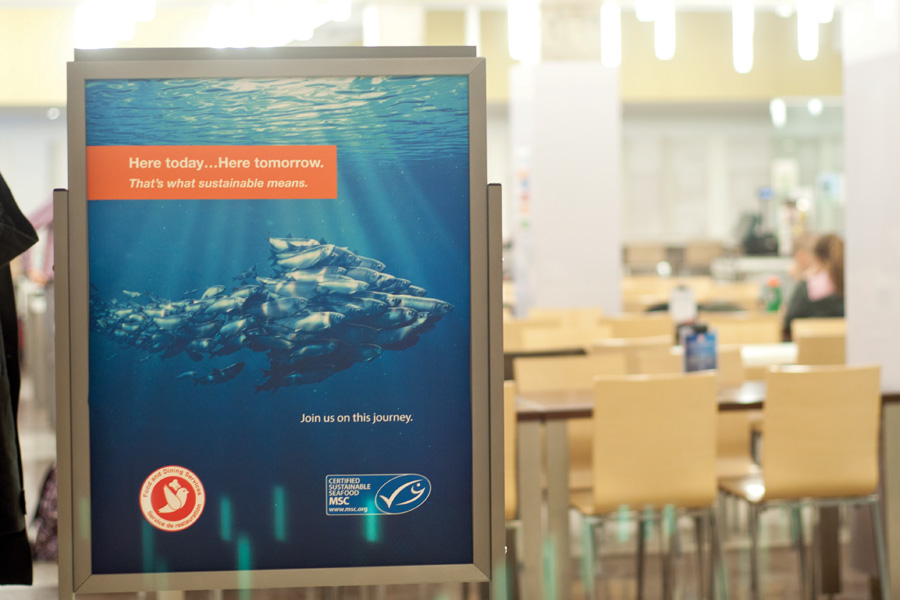McGill Food and Dining Services (MFDS) recently received a Chain of Custody Certification by the Marine Stewardship Council (MSC).
MSC, an independent, non-profit organization, helps to promote an increasingly sustainable seafood market by recognizing and presenting awards to sustainable fishing practices, and certifying fresh wild-caught seafood. The Chain of Custody Certification allows MFDS to use the MSC “eco-labels” for their fish products. McGill is the first Canadian university to receive the MSC certification.
In keeping with MFDS’s Strategic Plan on Sustainability, MFDS have been committed to supplying affordable sustainable options since the plan’s implementation in 2011. The MSC Chain of Custody Certification serves to provide a clear, accountable recognition of the sustainable seafood source.
“Without certification and the use of the MSC eco-label, the students, faculty, and community at large will not know that the seafood they are ordering [from] or consuming [at] McGill is from a fishery that met the rigorous MSC environmental standard, and [that it] can be traced back to the harvester who is fishing responsibly,” Maggie Beaton, an MSC representative, said.
MFDS Executive Chef Oliver De Volpi explained that, initially, MFDS had not set out to become certified, but that the process of pursuing sustainable choices eventually led to MSC certification. However, De Volpi explained that for MFDS to become MSC certified, its suppliers needed to receive MSC certification first. Therefore, MFDS worked with suppliers Sysco and GFS Canada, as well as contract caterer ARAMARK, convincing them to attain MSC certification.
De Volpi explained that once a supplier receives MSC certification, this facilitates their clients’ shift to sustainable practices as well.
“Because [GFS and Sysco] are certified [with MSC], in theory, other restaurants, hotels, [and] institutions [that they supply] could complete the certification process much easier,” De Volpi said.
In its pursuit towards adjustment to sustainable practices, MFDS also worked with a group of students from the environment (ENVR) 401: applied students research class.
The ENVR 401 students undertook a research project that analysed which seafoods in the industry were optimal choices for McGill based on factors such as budgetary constraints and sustainability. Their research was financed by the Sustainability Projects Fund—a fund granted by McGill’s Office of Sustainability to projects that help build a culture of sustainability on campus.
Professor George McCourt, an ENVR 401 instructor, was the supervisor for this particular student research group.
“We were going to look at what the certification of seafood meant,” McCourt explained. “The research was to extract the most applicable aspect of each seafood certification body to create a McGill specific certification process, which would help them inform their seafood purchasing program.”
The students completed their research in December 2011, and composed a realistic guide of sustainable seafood options for MFDS.
Following a review of the research results, MFDS adopted the findings and implemented them in April 2011. De Volpi especially commended Will Agnew (BA ‘11), who was part of the student research team, and remained an active force in McGill’s process of becoming MSC certified even after graduation.
According to De Volpi, the switch to MSC certification will not greatly impact students price-wise, as MFDS will be absorbing any additional cost by making portion sizes of other dishes slightly smaller or using less expensive items in the place of more expensive ones.
“Perhaps the portion becomes 150g down from 165g, or perhaps we eliminate roast leg of lamb and replace [it] with roast beef, [which makes] 50 per cent savings,” said De Volpi.
Students reacted positively to the news of MFDS’ certification.
“I think people will be more willing to eat the seafood, knowing that it’s certified [and] coming from a reputable source,“ Christine Gannon, U1 Arts and Science, said. “I’ll feel like I’m making the right choice when I [consume those products].”
“It’s an achievement to be proud of,” Alan Chen, U1 Arts and Science, said. “I think they should extend [that] transparency to our other foods. It’s a good first step, but we do need to take further steps to making things more sustainable.”
These sustainable seafood choices will be available at four residential dining halls—Bishop Mountain Hall, Carrefour Sherbrooke, New Residence, and Royal Victoria College—with MSC certified wild species accounting for 40 per cent of all seafood served.








